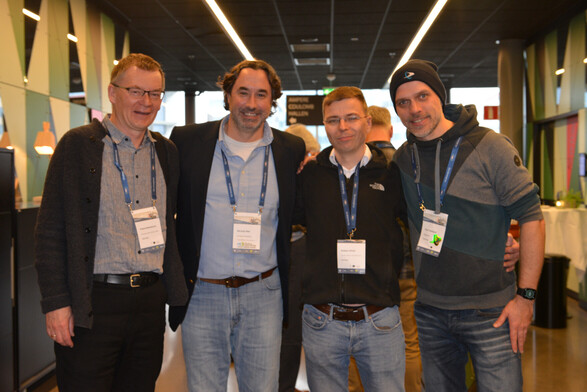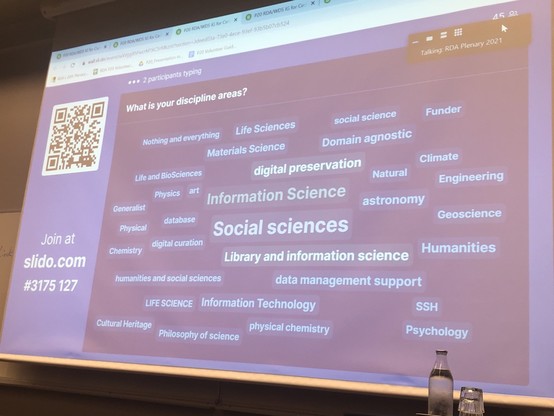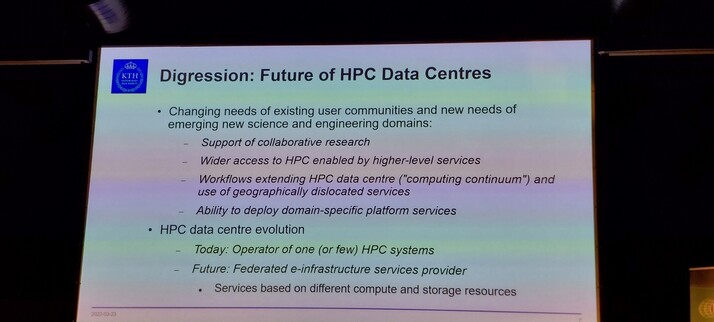re3data · @re3data
245 followers · 11 posts · Server openbiblio.social👀 Rare snapshot of @rbert, Michael Witt, Robert Ulrich, and @paul4kant from the #RDAplenary 20 in #Gothenburg...
Since the #re3data team is scattered across several continents, face-to-face meetings are always very special occasions for us.
Big thank you to the #ResearchDataAlliance for facilitating this reunion! 🙌
#rdaplenary #gothenburg #re3data #researchdataalliance
Joan Murphy · @joanofarchives
8 followers · 29 posts · Server mastodon.ieThe final session of the week for me at #rdaplenary. DDI-CDI session contextualises the complexity of data as it considers the concept of marital status. @rda_ireland @dri_ireland
DINI/nestor-AG Forschungsdaten · @DINInestorAGFD
89 followers · 61 posts · Server openbiblio.socialDanke für die 3 Tage #RDAPlenary! Es war ein tolles Programm und hervorragende Vernetzungsmöglichkeiten! Wir freuen uns schon auf RDA P21 in Salzburg vom 23.–26. Oktober 2023 #RDM
Francois Sabot · @francois_sabot
316 followers · 802 posts · Server genomic.socialRT @LouBezuidenhout
Great to raise awareness of the exciting work going on in Africa with the @aosp_africa #RDAPlenary @resdatall @motshegwat being a great ambassador, as always!
Joan Murphy · @joanofarchives
8 followers · 28 posts · Server mastodon.ieAt the #rdaplenary hearing about the changes to the #CoreTrustSeal certification process. Lots of documentation and training videos on their YouTube channel to help repos understand how old and new versions map to one another. @dri_ireland
Micky · @mickylindlar
267 followers · 535 posts · Server digipres.clubDiverse audience at our #rdaplenary #TRUST and certification WG today! 35% are from CTS certified repositories, 19% from TRUST principle endorsing institution
Nanette Rissler-Pipka · @NanetteRissler
311 followers · 103 posts · Server fedihum.org#rdaplenary time to say goodbye Gothenburg. It was such a pleasure to meet you all and planning new activities together.
Hugh Shanahan · @hughshanahan
290 followers · 856 posts · Server mstdn.socialI will be stepping away from #RDAplenary this afternoon to attend a talk from Sally Rumsey (@SallyRumsey1 on twitter) of cOAlition S who will be talking to Royal Holloway's Open Research group on Open Access.
Hugh Shanahan · @hughshanahan
290 followers · 856 posts · Server mstdn.socialAll that said, I'm attending an excellent session on Trusted Research Environments (TREs) at #RDAPlenary. It seems that there are many different types of TREs out there and we need to get a survey here.
Hugh Shanahan · @hughshanahan
290 followers · 856 posts · Server mstdn.socialThere is a dark little voice inside my head as I watch the discussions at #RDAPlenary on machine readability. Just as this is taking off LLMs are providing easy answers that have unknown levels of noise and bias and are based on entirely closed data sets 🙁
Micky · @mickylindlar
267 followers · 533 posts · Server digipres.clubYay! Preservation Policy and Certification are on the list of 17 critierias that the DRAWG drafted to describe repositories! #RDAplenary
Micky · @mickylindlar
267 followers · 532 posts · Server digipres.clubNext up for me at #RDAPlenary is the "Data Repository Attributes Working Gruop (DRAWG)" Meeting. Curious to see if there's any overlap to the TRUST principles that we will be talking about right after lunch.
V · @vtenhunen
24 followers · 21 posts · Server mastodon.worldDirk Pleiter from KTH talked about integrations between HPC and data infrastructures. See some shortcomings and future development. #rdaplenary
Joan Murphy · @joanofarchives
5 followers · 27 posts · Server mastodon.ieNanette Rissler-Pipka · @NanetteRissler
310 followers · 100 posts · Server fedihum.org#rdaplenary in the plenary session 'Building the RDA Community for the Future' when @hilaryhanoe presents the regional hubs in RDA, I'm happy to see the wonderful team from #RDAeurope with whom we work together in #EOSCFuture
#rdaplenary #rdaeurope #eoscfuture
Nanette Rissler-Pipka · @NanetteRissler
310 followers · 100 posts · Server fedihum.org@quinnanya this is so important and I'm really glad to see Digital Humanities projects also represented at #rdaplenary and in the #GLAM labs
Nanette Rissler-Pipka · @NanetteRissler
308 followers · 95 posts · Server fedihum.org#rdaplenary is already hinting to the next big conference coming up #DH2023 where some of the 'use cases' presented by the #loc team will be represented. Like @quinnanya study about children's literature and many more
Micky · @mickylindlar
265 followers · 526 posts · Server digipres.clubDear RDM folk. Please don't call re3data an "archival repository". it's a registry. And please don't call Zenodo an archival repository, either. It's a repository, true, but that doesn't make it archival necessarily.
#RDAPlenary
Micky · @mickylindlar
265 followers · 524 posts · Server digipres.clubOk, my previous criticism aside, just hearing about a really interesting model at Chinese Academy of Sciences. the basic assumption is that a file / a dataset actually produces several "digital objects" - e.g. a DataFrame being one digital object, a process such as a query on that DataFrame being a second and the result being a third. It's a totally different way of how we look at digital objects in a current archival context. but not necessarily a new question. #RDAPlenary
Micky · @mickylindlar
265 followers · 524 posts · Server digipres.clubOk, my previous criticism aside, just hearing about a really interesting model at Chinese Academy of Sciences. the basic assumption is that a file / a dataset actually produces several "digital objects" - e.g. a DataFrame being one digital object, a process such as a query on that DataFrame being a second and the result being a third. It's a totally different way of how we look at digital objects in a current archival context. but not necessarily a new question. #RDAPlenary








